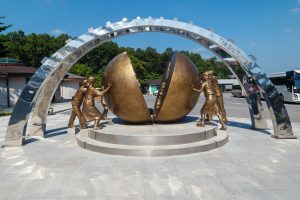The relative calm on the Korean Peninsula could once again give way to crisis. A recent North Korean military parade and the first-ever test of a missile system designated for the delivery of tactical nuclear weapons serve as reminders of more than a decade of unconstrained weapons development under Kim Jong Un. The risk of escalation resulting in nuclear use by North Korea – either deliberately or inadvertently – is significant and may continue to grow. Pyongyang has ossified its status as a nuclear weapons power.
Despite this, successive governments in Seoul and Washington have continued to frame their policy objectives toward North Korea in terms of complete denuclearization, a framing originally adopted in the early 1990s. This may be politically correct, but is counterproductive to achieving more pressing priorities, namely reducing the risk of a conflict that escalates to the use of nuclear weapons.
The incoming Yoon administration in Seoul has announced its intentions to augment South Korea’s deterrence posture toward North Korea by resuming military exercises, strengthening missile defenses, augmenting Seoul’s military capabilities, and increasing the visibility of U.S. extended nuclear deterrence. In the face of North Korea’s growing and diverse missile arsenal, it is understandable for South Korea to build out its deterrence capabilities.
Meanwhile, Russia’s invasion of Ukraine – backed with wanton nuclear threats against outside intervention – has also raised fears that Kim Jong Un might be inspired to attempt a similar operation. Noted North Korea expert Andrei Lankov, for example, speculates that Pyongyang could “use their tactical weapons to obliterate the significant conventional superiority of the South Korean forces, and install an ambassador in Seoul with veto power over any South Korean policy they do not like.” Driven by such concerns, it is little wonder that some 70 percent of South Koreans favor acquiring their own nuclear deterrent.
Yet Yoon’s deterrence-centric approach to North Korea leans into a burgeoning arms competition and will likely spur North Korean responses that potentially leave South Korea less secure. The Korean Peninsula has been the throes of a classic security dilemma – with each country building up capability to offset the other’s – for years now. South Korean fielding of pre-emptive strike capabilities, and North Korea’s putative tactical nuclear weapons, stand to further exacerbate escalation risks and undermine crisis stability.
In reality, denuclearization and deterrence are opposing policy objectives. Efforts to strengthen deterrence, which drive North Korea to increase reliance on nuclear weapons, make denuclearization less plausible. Fears of nuclear coercion do not obviate the value of creative and critical thinking about alternative paths. Ultimately, South Korean, U.S., and regional security would be better improved at lower cost through risk reduction measures to mitigate the potential that provocations escalate to catastrophic conflict.
The outgoing Moon administration sought one such path by pursuing a joint declaration to formally end (in political terms) the Korean War. Although that initiative failed to gain traction, the impetus to think more broadly about how to improve security on and around the Korean Peninsula is sound. In particular, seeking ways to reconnect North Korea to regional security processes as part of a broader effort to promote a security architecture for Northeast Asia seems logical. This was once recognized and incorporated into the Six-Party Talks process, for instance.
Amid pandemic fears, North Korea has shut its borders, but eventually, this period of insularity will give way to diplomatic opportunities. When this happens, Seoul and Washington should test the plausibility of regional efforts that could lead to risk reduction on the Korean Peninsula. Recently, a group of senior scholars and practitioners from the region convened by the Asia Pacific Leadership Network endorsed a list of ideas aimed at building a more robust security “eco-system.” Three ideas, in particular, deserve serious consideration in the context of North Korea.
First, the COVID-19 pandemic, which North Korea deemed a threat to its “national survival” as early as January 2020, has cast a spotlight on public health deficiencies within the country. Improving regional cooperation on public health infrastructure and sharing preventive best practices could promote broader trust-building. Second, North Korea has become increasingly prone to heavy rains and flooding, which should prompt a serious consideration of disaster relief cooperation opportunities, including with China.
Beyond this, it will be important for regional policy experts and scholars to remain engaged through track two dialogues on nuclear risk reduction and lowering the risks that may stem from arms-racing in the region. Beyond the Korean Peninsula, the broader East Asian region faces no shortage of challenges; regional dialogues can help promote mutual understanding that could have positive downstream effects on inter-Korean peace and security.
Each of these paths could help reintegrate North Korea in the region and convince its leaders that peace and prosperity for the North Korean people can be achieved with less risk. For now, there are clear limits to what is possible so long as Kim Jong Un keeps his government purposefully estranged from the international community. Despite the poor prognosis for short-term breakthroughs, it is incumbent on regional leaders – especially in Seoul and Washington – to take a longer view on promoting regional peace and security by ensuring that Pyongyang’s isolation doesn’t become permanent.

































